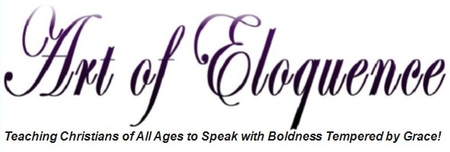"Conversation should be pleasant without scurrility, witty without affectation, free without indecency, learned without conceitedness, novel without falsehood." ~William ShakespeareShakespeare packs quite a lot into this one line and I thought it so profound that I wanted to disect it to get the full impact of what he is saying here. Shakespeare says that conversation should be pleasant without scurrility. Scurrility is abusive language or a rude remark. This is quite unique today with the invention of electronic communication such as you are reading here. More and more I see people who feel free or even justified to be rude just because they don't have to look their victim in the eye as they do it. Next he says conversation should be witty without affectation. Affectation means a speech that is not natural for you. It is natural to want to put your best foot forward when we present ourselves to others but it is important that we don't change who God made us to fit that bill. I'm a goofball. It comes naturally. I goof around with language when I write and speak. It's natural for me. If I were to try to be some Serious Sally, you might feel like I was putting on airs. In fact, I have a story to tell you about that. Way back when I first started writing communication studies, my husband was in charge of editing my work. He doesn't write the way I do. He's got a fabulous sense of humor, but he doesn't write that way. His style is more formal and polished. After reading over his changes, I remember thinking it sounded like I swallowed a dictionary! I took it back to him and said, "Lighten up, Francis!" (from a line in a movie) God gave each of us a unique perspective. Nobody wants to read what you think someone else would say. They want to know what YOU think. Next Shakespeare says we should be free without indecency. Free speech should not be so free that we compromise moral decency. Free speech has its consequences and one of them is that we have now become a society where anything goes, but very little is valuable. It's hard to draw that line in law, but most of us know when it's been crossed. Ephesians 4:29 tells us, "Let no corrupt communication proceed out of your mouth, but that which is good to the use of edifying, that it may minister grace unto the hearers." For the past few weeks, I've been posting some fabulous videos of Christian comedians and I've noticed something. It takes so much more talent and creativity to be funny without swearing and what results makes you laugh even more! Next he talks about being learned without conceitedness. Conversation should strive to be intelligent discussion without putting on those airs. Anne Morrow Lindbergh said "Good communication is as stimulating as black coffee and just as hard to sleep after." Do you have someone in your life that you dread talking to? Someone who either never says anything new or someone who is always talking about himself so that you get bored with the conversation? Do you have someone in your life you just LOVE talking to? Maybe this person is an elderly relative who always has such rich and interesting stories to tell about life in the last century. Conversation can be dull or it can have you hanging on every word. It's up the the individual to give something interesting of himself and there is a fine line between giving of himself and giving himself. Finally Shakespeare talks about being novel without falsehood. This goes along the same lines as the previous segment. There are those for whom boredom breaks out of his mouth because he never interjects a novel idea into the conversation. Then there are those who spin wild tales just to wow their audience who is fully aware that almost none of this fantastic tale is actually true. I hope you enjoyed your Communication lessons from Shakespeare! I now return you to your regularly scheduled era. ~*~*~*~*~*~*~*~*~*~*~*~*~*~*~*~ JoJo Tabares holds a degree in Speech Communication, but it is her humorous approach to communication skills which has made her a highly sought-after Christian speaker and writer. Her articles appear in homeschool publications, such as Homeschool Enrichment Magazine and The Old Schoolhouse Magazine, which also endorses her Say What You Mean curricula. You can also find JoJo on web sites such as Crosswalk.com and Dr.Laura.com. For more information on communication FUNdamentals and Christian-based communication skills for the whole family, please visit http://www.ArtofEloquence.com
Communication Lessons from Shakespeare
Communication Lessons from Shakespeare
While going through my email files, I found the following quote:
2 comments
-
A great post, JoJo. I agree that our writing should reflect who we are. It won’t sound exactly as we would talk, but it should be similar and let others get to know us.
I know when I send out emails, I like to put little smileys or other symbols in because that reflects who I am. When I write an article, I use more of an informal tone because that is how I talk.
Good lessons from Shakespeare!
-
I love this post, JoJo – and I have always loved Shakespeare for the reasons that you list here. It stimulates the mind and causes us to rethink our words – written or said – they are powerful.
